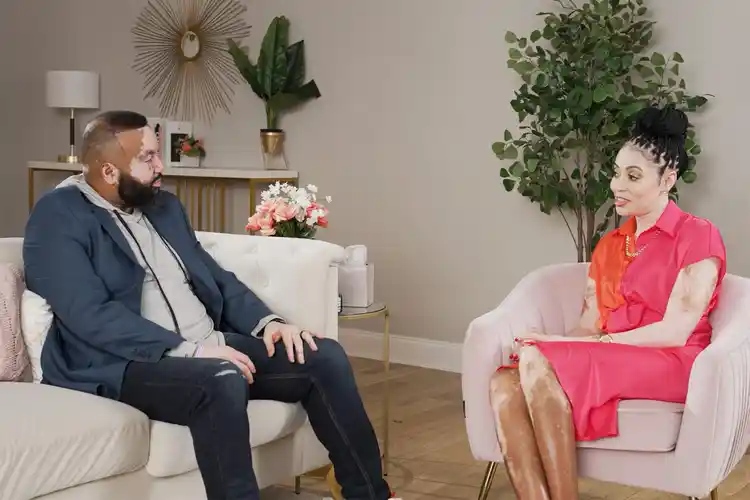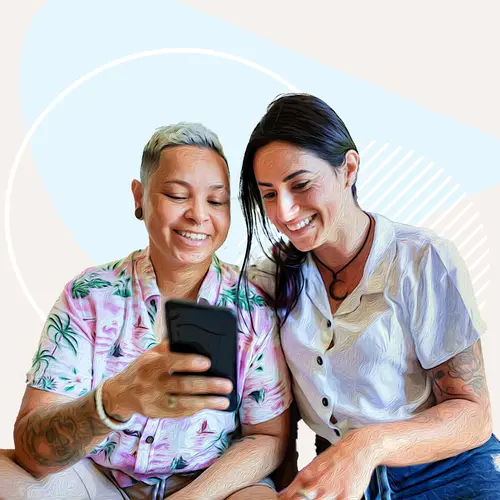What They Don’t Tell You About Vitiligo

Hide Video Transcript
Video Transcript
ALISHA ARCHIBALD
When you first got diagnosed, how did you feel about it? Or when did you get diagnosed with vitiligo? [MUSIC PLAYING]
JUSTIN HALL
So I think I saw my first spot when I was 17. And I had two dime-sized spots on my arms. And they were on my elbows. So I assumed they were from floor burns from diving for basketballs. And so and I had lots of floor burns on my knees and arms. I assumed that was what it was. And maybe like 3 years later, in my early 20s, I noticed the loss of pigment on my fingertips. ALISHA ARCHIBALD
Oh, wow. JUSTIN HALL
So that was when I went to a dermatologist. And she said, guess what, you have vitiligo. ALISHA ARCHIBALD
Well, it's interesting that you said that you had dime-sized spots. But mine didn't start on my arm. I had a dime-sized spot, too. But mine was actually on my forehead. JUSTIN HALL
That's right. ALISHA ARCHIBALD
Yeah. Do you remember me talking about that? So it was a dime-sized spot on my hairline. And for me, when I saw it, I honestly thought-- I kind of flicked at it at first because I didn't know what it was. And then I brushed it again. And immediately, I knew what it was. And I knew what it was because my grandmother had it. And for me, when I saw my spot, I kind of got fearful. What challenges have you faced being a person of color with vitiligo?
JUSTIN HALL
The elephant in the room that we don't speak about is if you're darker complected, if you're someone of color, it's just more noticeable. It is noticeable every moment of the day. And so maybe myself not being as darker complected, maybe sometimes it wasn't as noticeable-- ALISHA ARCHIBALD: --as noticeable, you think?
JUSTIN HALL
--because I meet other people throughout our travels, and not to take away from their stories, because I meet plenty of people fair complected and white. And they say, hey, this bothered me in school because when I would run and I would get-- the redder I got, you could see it. Or when I tanned, then you could see it. But if they didn't do those things, it wasn't noticeable-- ALISHA ARCHIBALD: --as noticeable?
JUSTIN HALL
--as people with color. And it sticks out. But that's the thing we don't talk about. And it's not to take away from their stories or what they've experienced. But with us, the darker complected you are, it sticks out. ALISHA ARCHIBALD
Yes. And I don't know if you remember this story. I went into University of Georgia to get some vaccinations because I was getting ready to travel out of the country. Well, it was still kind of cool. I had on a shirt. I think I probably had on a sweatshirt. The lady who did my intake, she-- I didn't notice it until I got home, but she had put my race down as Caucasian. I didn't realize how it affected me, because I'm like, how could she not-- you know, I'm saying to myself, How could she not know I was African American? How could she not know I was Black? But then I went back and I thought about it. I was like, well, if she only seen me from neck up and she didn't see my hair, maybe she did think that.
JUSTIN HALL
Most of the time-- and this is not to take away from anybody else's story, but I forget. I'm not thinking about my vitiligo most times. ALISHA ARCHIBALD
Maybe because you've had it for so long. JUSTIN HALL
Yeah, and that too. I think, recently, I met-- I was walking out of a-- walking out of Sam's Club or something. And a woman stopped me. She had on a mask. And she had on a hoodie and sweatpants or something. And she pulled down her mask. She's like, we're alike. And I realized she had vitiligo. And she's like, but you're not covered up. Aren't you-- and she was like, people are going to-- and I was like, man, it's 137 degrees outside. ALISHA ARCHIBALD
[LAUGHS] JUSTIN HALL
I'm like, everybody's going to get these spots. ALISHA ARCHIBALD
What kind of advice would you give other people living with vitiligo and how to embrace their vitiligo? JUSTIN HALL
Being a teenager child is hard enough without loss of pigment. So those things-- how can we help children? How can we help? How can we help adults? Like we said-- ALISHA ARCHIBALD
That haven't been out the house in 3 years. JUSTIN HALL
We meet adults-- we meet people all the time that tell us they-- or haven't-- the thing I meet-- men that say all the time, I don't think I'll ever get married. And that's-- ALISHA ARCHIBALD
That's sad. JUSTIN HALL
Yeah, that's sad. And it's like, as a man, I never-- I don't know. I always thought, as a man, when you're ready to get, married you go and get married. ALISHA ARCHIBALD
Go find your woman. JUSTIN HALL
Go find-- yeah. And so we have to figure out, what are those other problems? This should not be something that's-- ALISHA ARCHIBALD
The end. JUSTIN HALL
Yeah. And it should not be something that's holding you back. ALISHA ARCHIBALD
We are at a place of acceptance. But we knew and know just what you were just saying, that there are other people who are not where we are. So we know that we have to keep doing the work out there in the community because everyone's not at a place of acceptance. We need to keep making contacts with these doctors to let-- and to be able to take that back to our community or people who want treatment. 